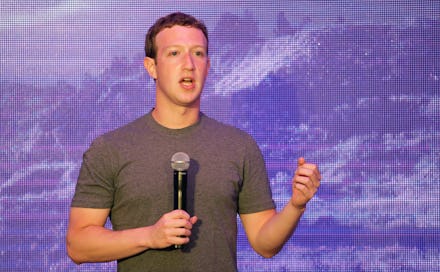Two Weeks Ago, Mark Zuckerberg Said "Je Suis Charlie." He Was Full of It.

On Jan. 9, following the terrorist attacks on the offices of French satirical magazine Charlie Hebdo and the Paris metro area that resulted in 20 deaths, Facebook CEO Mark Zuckerberg posted a strongly worded statement on the critical role free speech plays in a democratic society that proclaimed #JeSuisCharlie.
"Facebook has always been a place where people across the world share their views and ideas. We follow the laws in each country, but we never let one country or group of people dictate what people can share across the world," he wrote." I won't let that happen on Facebook. I'm committed to building a service where you can speak freely without fear of violence."
But just two weeks later, the BBC is reporting that Zuckerberg's company has agreed to take down a Facebook pages deemed offensive to the Prophet Muhammad by Turkish censors, thereby caving on the free speech issue.
Given the choice between risking losing access to the site's 40 million Turkish members and complying with Turkish law, Facebook made the latter — apparently contradicting Zuckerberg's promise that although the company follows local law it would "never let one country or group of people dictate what people can share across the world."
The background: In Turkey, where Facebook's latest transparency report documented a record 1,893 takedown requests in the first half of 2014, those 40 million members will now have what's visible on the site dictated by local authorities.
It's not the first time Facebook has made some dirty compromises to retain access to a growing market: The site is apparently working towards bringing a "highly censored" version of the site to China's estimated 649 million Internet users since losing access to them in 2009.
Facebook declined comment to the BBC, but in general the site tends to follow local regulations even when it results in censorship. It claims that maintaining access to markets that would otherwise go without Facebook at all is a net positive, allowing people a taste of the real thing.
But when Russian government orders to censor content hit Facebook, Twitter and Google in 2014, the Wall Street Journal reported that Facebook was the only site that had initially complied. Google refused to follow the orders, while Twitter went to the unprecedented length of alerting users that the government was out to get them.
More shade: Zuckerberg is also coming under criticism for refusing to share the takedown notice Facebook received that led to the decision. TechCrunch's Josh Constine notes that both Twitter and Google regularly post these notices on ChillingEffects.org in an attempt to make the process as transparent as possible.
But Facebook would apparently prefer to keep the public in the dark about the specifics of its agreement with the Turkish government, even though every concession probably makes further ones more likely. Slate's Lily Hay Newman suggests that if this was an opportunity for social media sites to show their core principles, big social media companies aren't rising to the challenge.
Zuckerberg is sending totally different messages. On the one hand, he's happy to tell his users that Facebook is committed to free, nonviolent and uncensored speech. On the other, Facebook is absolutely willing to compromise those principles when doing so is convenient. It probably hopes users aren't paying very close attention.
h/t Washington Post